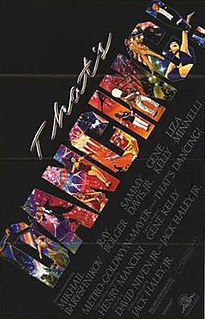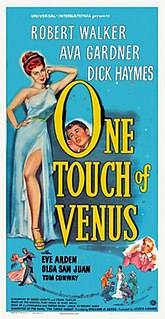"Take Me Out to the Ball Game" is a 1908 Tin Pan Alley song by Jack Norworth and Albert Von Tilzer which has become the unofficial anthem of North American baseball, although neither of its authors had attended a game prior to writing the song. The song's chorus is traditionally sung during the middle of the seventh inning of a baseball game. Fans are generally encouraged to sing along, and at some ballparks, the words "home team" are replaced with the team name.
The year 1943 in film featured various significant events for the film industry.
That's Entertainment! is a 1974 American compilation film released by Metro-Goldwyn-Mayer to celebrate the studio's 50th anniversary. The success of the retrospective prompted a 1976 sequel, the related 1985 film That's Dancing!, and a third installment in 1994.

That's Entertainment! III is a 1994 American documentary film released by Metro-Goldwyn-Mayer to celebrate the studio's 70th anniversary. It was the third in a series of retrospectives that began with the first That's Entertainment! (1974) and That's Entertainment, Part II (1976). Although posters and home video packaging use the title without an exclamation mark, the actual on-screen title of the film uses it.

That's Dancing! is a 1985 American compilation film produced by Metro-Goldwyn-Mayer that looked back at the history of dancing in film. Unlike the That's Entertainment! series, this film not only focuses specifically on MGM films, but also included films from other studios.
Hugh Martin was an American musical theater and film composer, arranger, vocal coach, and playwright. He was best known for his score for the 1944 MGM musical Meet Me in St. Louis, in which Judy Garland sang three Martin songs, "The Boy Next Door," "The Trolley Song," and "Have Yourself a Merry Little Christmas." The last of these has become a Christmas season standard in the United States and around the English-speaking world. Martin became a close friend of Garland and was her accompanist at many of her concert performances in the 1950s, including her appearances at the Palace Theater.

Roman Scandals is a 1933 American black-and-white pre-Code musical film starring Eddie Cantor, Ruth Etting, Gloria Stuart, Edward Arnold and David Manners. It was directed by Frank Tuttle. The film features a number of intricate production numbers choreographed by Busby Berkeley. The song "Keep Young and Beautiful" is from this film. In addition to the starring actors in the picture, the elaborate dance numbers are performed by the "Goldwyn Girls". The title of the film is a pun on Roman sandals.

Babes on Broadway is a 1941 American musical film starring Mickey Rooney and Judy Garland and directed by Busby Berkeley, with Vincente Minnelli directing Garland's big solo numbers. The film, which features Fay Bainter and Virginia Weidler, was the third in the "Backyard Musical" series about kids who put on their own show, following Babes in Arms (1939) and Strike Up the Band (1940). Songs in the film include "Babes on Broadway" by Burton Lane (music) and E.Y. "Yip" Harburg (lyrics), and "How About You?" by Lane with lyrics by Ralph Freed, the brother of producer Arthur Freed. The movie ends with a minstrel show performed by the main cast in blackface.

Till The Clouds Roll By is a 1946 American Technicolor musical film produced by Metro-Goldwyn-Mayer. It is a fictionalized biopic of composer Jerome Kern, portrayed by Robert Walker. Kern was originally involved with the production, but died before it was completed. It has a large cast of well-known musical stars of the day who appear performing Kern's songs. It was the first in a series of MGM biopics about Broadway's composers; it was followed by Words and Music, Three Little Words, and Deep in My Heart.
"How About You?" is a popular song composed by Burton Lane, with lyrics by Ralph Freed. It was introduced in the 1941 film Babes on Broadway by Judy Garland and Mickey Rooney.

One Touch of Venus is a 1948 American black-and-white romantic musical comedy film directed by William A. Seiter starring Robert Walker, Ava Gardner, Dick Haymes, and Eve Arden. released by Universal-International, and based on the 1943 Broadway musical of the same name, book written by S. J. Perelman and Ogden Nash, with music composed by Kurt Weill. However, the film omits most of Weill's music. The actors did their own singing, except for Ava Gardner (Venus) whose singing was dubbed by Eileen Wilson. The plot is from an original 1885 novella by Thomas Anstey Guthrie.
Go, Vandals, Go is the official fight song of the University of Idaho in Moscow.

Broadway Rhythm (1944) is a Metro-Goldwyn-Mayer Technicolor musical film. It was produced by Jack Cummings and directed by Roy Del Ruth.

Good News is a 1947 Metro-Goldwyn-Mayer musical film based on the 1927 stage production of the same name. It starred June Allyson, Peter Lawford, Mel Tormé, and Joan McCracken. The screenplay by Betty Comden and Adolph Green was directed by Charles Walters in Technicolor.

The Girl Most Likely (1958) is a musical and comedy film about a young woman who becomes engaged to three men at the same time. The film, a remake of Tom, Dick and Harry (1941), was directed by Mitchell Leisen, and stars Jane Powell, Cliff Robertson, and Keith Andes. The choreography is by Gower Champion.

Meet the People (1944) is a Metro-Goldwyn-Mayer musical comedy film made, and set, during World War II, and starring Lucille Ball and Dick Powell and featuring Virginia O'Brien, Bert Lahr, Rags Ragland and June Allyson. The film takes its title from a successful Los Angeles musical revue, which ran on Broadway from December 25, 1940 to May 10, 1941. Vaughn Monroe and his orchestra, Spike Jones and his City Slickers, and Virginia O'Brien were also in the original stage cast. O'Brien sings the hit song "Say That We're Sweethearts Again".

Girl Crazy is a 1943 American musical film starring Judy Garland and Mickey Rooney. Produced by the Freed Unit of Metro-Goldwyn-Mayer, it is based on the stage musical Girl Crazy – which was written by Guy Bolton and Jack McGowan, with music and lyrics by George and Ira Gershwin. It was the last of Garland and Rooney's nine movies as co-stars, the pair appearing only once more together on film, as guest stars in 1948's Words and Music.

Two Girls and a Sailor is a 1944 American musical film directed by Richard Thorpe and starring Van Johnson, June Allyson and Gloria DeHaven. Set on the American homefront during World War II, it's about two singing sisters who create a lavish canteen to entertain members of the military, thanks to financial contributions from a mysterious donor. The picture features a host of celebrity performances, including Jimmy Durante doing his hallmark "Inka Dinka Doo", Gracie Allen, and Lena Horne. Richard Connell and Gladys Lehman were nominated for the Academy Award for Best Original Screenplay.

The Hard Way is a 1943 Warner Bros. musical drama film directed by Vincent Sherman and starring Ida Lupino. The film was based on a story by Irwin Shaw which was reportedly based on Ginger Rogers' relationship with her first husband, Jack Pepper and her own mother, Lela.

Best Foot Forward is a 1941 musical with songs by Hugh Martin and Ralph Blane and a book by John Cecil Holm. Produced by George Abbott, after an out-of-town tryout, the production opened on Broadway on October 1, 1941 at the Ethel Barrymore Theatre, where it ran for 326 performances. It was directed by Abbott, with choreography by Gene Kelly, and starred Rosemary Lane. The show was Nancy Walker's Broadway debut and also launched June Allyson to stardom. Sets and lighting were by Jo Mielziner, and costumes were by Miles White.














